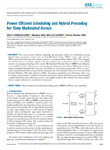Power Efficient Scheduling and Hybrid Precoding for Time Modulated Arrays

Use este enlace para citar
http://hdl.handle.net/2183/25191Colecciones
- Investigación (FIC) [1678]
Metadatos
Mostrar el registro completo del ítemTítulo
Power Efficient Scheduling and Hybrid Precoding for Time Modulated ArraysFecha
2020-01-22Cita bibliográfica
J. P. González-Coma and L. Castedo, "Power Efficient Scheduling and Hybrid Precoding for Time Modulated Arrays," in IEEE Access, vol. 8, pp. 21063-21076, 2020. doi: 10.1109/ACCESS.2020.2968572
Resumen
[Abstract] We consider power efficient scheduling and precoding solutions for multiantenna hybrid digital-analog transmission systems that use Time-Modulated Arrays (TMAs) in the analog domain. TMAs perform beamforming with switches instead of conventional Phase Shifters (PSs). The extremely low insertion losses of switches, together with their reduced power consumption and cost make TMAs attractive in emerging technologies like massive Multiple-Input Multiple-Output (MIMO) and millimeter wave (mmWave) systems. We propose a novel analog processing network based on TMAs and provide an angular scheduling algorithm that overcomes the limitations of conventional approaches. Next, we pose a convex optimization problem to determine the analog precoder. This formulation allows us to account for the Sideband Radiation (SR) effect inherent to TMAs, and achieve remarkable power efficiencies with a very low impact on performance. Computer experiments results show that the proposed design, while presenting a significantly better power efficiency, achieves a throughput similar to that obtained with other strategies based on angular selection for conventional architectures.
Palabras clave
Array signal processing
Convex programming
Millimetre wave communication
Millimetre wave phase shifters
MIMO
Communication
Precoding
Telecommunication scheduling
Convex programming
Millimetre wave communication
Millimetre wave phase shifters
MIMO
Communication
Precoding
Telecommunication scheduling
Versión del editor
ISSN
2169-3536





